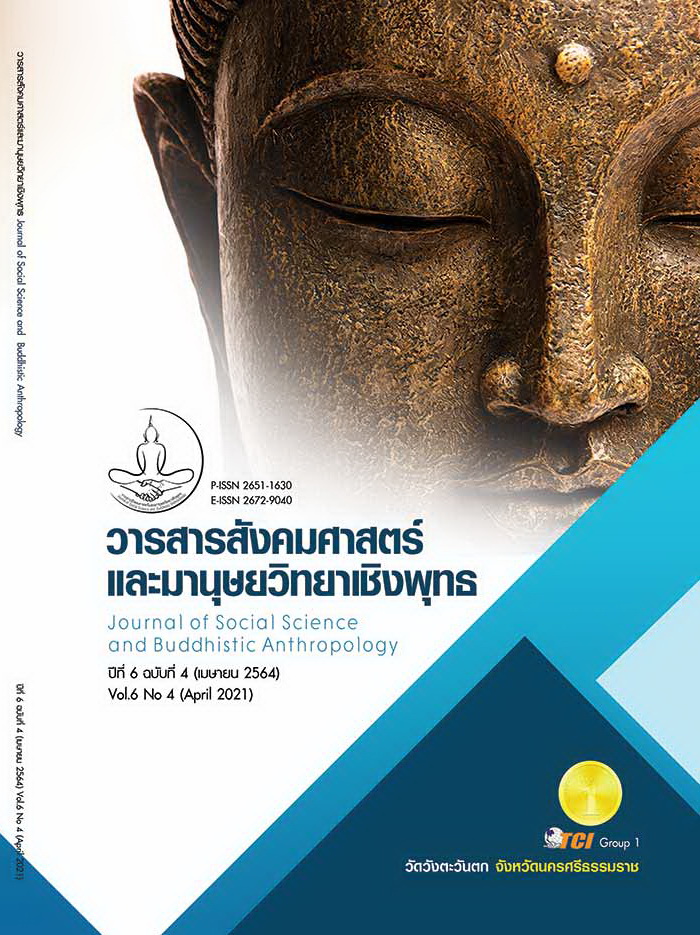DEVELOPMENT OF THE ACTIVE LEARNING MANAGEMENT ABILITIES OF ELEMENTARY TEACHERS THROUGH THE PROFESSIONAL LEARNING COMMUNITY PROCESS
Keywords:
Active learning management abilities, Professional learning community process, Elementary teachersAbstract
This research aimed 1) to develop components and indicators of active learning management abilities (ALMAs) 2) to develop a professional learning community (PLC) process, and 3) to examine the effects of the PLC process on the development of the ALMAs of elementary science teachers. This research is Research and Development. The samples were seven science elementary teachers at Ban Na Wai School, Chiang Mai province were voluntarily participated in the study, in the second semester of academic year 2019. The instrument was the ALMAs questionnaire. The qualitative data were collected by a focus group interview and analyzed by the content analysis method. The quantitative data were collected by the ALMAs questionnaire and analyzed by descriptive statistics, a Friedman test, and a Wilcoxon sign rank test. This research found that the components of the ALMAs consisted of the following: (1) the ability to write lesson plans comprised of four subcomponents and 18 indicators; and (2) the ability to use active learning in science teaching that was comprised of six subcomponents and 17 indicators. The PLC process consisted of three steps: prepare, practice and learn, and conclude. The participants presented post-intervention mean ALMA scores that were 75% higher than the standard. In addition, participants had post-intervention mean ALMA scores significantly increased at the p-value of .05.
References
กระทรวงศึกษาธิการ. (2560). ตัวชี้วัดและสาระการเรียนรู้แกนกลาง กลุ่มสาระการเรียนรู้วิทยาศาสตร์ (ฉบับปรับปรุง พ.ศ. 2560) ตามหลักสูตรแกนกลางการศึกษาขั้นพื้นฐาน พุทธศักราช 2551. กรุงเทพฯ:
โรงพิมพ์ชุมนุมสหกรณ์การเกษตรแห่งประเทศไทย.
ชาริณี ตรีวรัญญู. (2558). การพัฒนาบทเรียนร่วมกัน (Lesson Study: LS). ใน บังอร เสรีรัตน์; ชาริณี
ตรีวรัญญูและเรวณี ชัยเชาวรัตน์. 9 วิถีสร้างครูสู่ศิษย์ เอกสารประมวลแนวคิดและแนวทางพัฒนาวิชาชีพ ครูสําหรับคณะทำงาน: โครงการพัฒนาระบบกลไกและแนวทางหนุนเสริมชุมชนการเรียนรู้ทางวิชาชีพเพื่อ พัฒนาผู้เรียน. (หน้า 42). กรุงเทพฯ: สํานักงานส่งเสริมสังคมแห่งการเรียนรู้และคุณภาพเยาวชน.
เชาวฤทธิ์ จงเกษกรณ์ และปราญชลี มะโนเรือง. (2562). การพัฒนาการจัดกิจกรรมการเรียนรู้แบบ Active learning เพื่อผู้เรียนยุคใหม่ตามนโยบายลดเวลาเรียนเพิ่มเวลารู้. โรงเรียนแหลมสิงห์วิทยาคม อำเภอ แหลมสิงห์ จังหวัดนนทบุรี.
นงลักษณ์ วิรัชชัย. (2551). การพัฒนาตัวบ่งชี้การประเมิน. การประชุมวิชาการเปิดขอบฟ้าคุณธรรม จริยธรรม. วันที่ 29 สิงหาคม 2551. โรงแรมแอมบาสเดอร์.
ปณตนนท์ เถียรประภากุล และเฉลิมชัย สุขจิตต์. (2561). ผลการพัฒนาศักยภาพทางวิชาการผู้บริหาร สถานศึกษาและครูสังกัดคณะกรรมการการศึกษาขั้นพื้นฐาน. วารสารศิลปากรศึกษาศาสตร์วิจัย,
10(1): 107 – 119.
ลภัสรดา เวียงคำ และคณะ. (2560). การพัฒนารูปแบบการดำเนินงานชุมชนการเรียนรู้ทางวิชาชีพของครู วิทยาลัยชุมชนพังงา. วารสารปาริชาติ, 30(3), 26-34.
วันเพ็ญ คำเทศ. (2558). การใช้คำถามในการจัดการเรียนรู้วิทยาศาสตร์แบบ 5 ขั้นตอน. นิตยสาร สสวท, 43(196), 25 – 30.
วิจารณ์ พานิช. (2555). วิถีสร้างการเรียนรู้เพื่อศิษย์ในศตวรรษที่ 21. กรุงเทพฯ: มูลนิธิสดศรี-สฤษดิ์วงศ์.
วิชัย วงษ์ใหญ่และมารุต พัฒผล. (2562). การพัฒนาคุณภาพการจัดการเรียนรู้ตามแนวคิดชุมชนแห่งการเรียนรู้ ทางวิชาชีพ. ศูนย์ผู้นำนวัตกรรมหลักสูตรและการเรียนรู้, กรุงเทพมหานคร. เรียกใช้เมื่อ 8 ธันวาคม 2562, จาก www.curriculumandlearning.com
สถาบันส่งเสริมการสอนวิทยาศาสตร์และเทคโนโลยี. (2553). มาตรฐานครูวิทยาศาสตร์และเทคโนโลยี (ฉบับ ปรับปรุง 2553). เรียกใช้เมื่อ 12 ธันวาคม 2561, จาก http://sa.ipst.ac.th/?page_id=791
สุพิษ ชัยมงคล. (2556). กลยุทธ์การพัฒนาสมรรถนะการจัดการเรียนรู้เชิงรุกของครูผู้สอนระดับประถมศึกษาในพื้นที่สูง. ในดุษฎีนิพนธ์ครุศาสตรดุษฎีบัณฑิต สาขาวิชาการบริหารการศึกษา. มหาวิทยาลัยราชภัฎเชียงราย.
สำนักงานเลขาธิการคุรุสภา. (2561). ประกาศสำนักงานเลขาธิการคุรุสภา เรื่อง แนวทางการดำเนินงานเสริมสร้างกระบวนการชุมชนแห่งการเรียนรู้ทางวิชาชีพ เพื่อพัฒนาจรรยาบรรณวิชาชีพผ่านระบบเทคโนโลยีสารสนเทศ (Ethics in Professional Learning Community : e-PLC) ประจำปี 2561. เรียกใช้เมื่อ 10มีนาคม 2562 จาก http://www.ksp.or.th/ksp2013/content/view.php?mid=92&did=1379&tid=
Bluman, Allan G. (2018). Elementary Statistics : A Step by Step Approach. Tenth ed.
Newyork: McGraw-Hill Education.
Darling-Hammond, L. (1999). Teacher Quality and Student Achievement: A Review of State Policy Evidence. Education Policy Analysis Archives, 8(1), 1 – 44.
Harris, A. & Jones, M. (2010). Professional learning communities and system improvement. Improving school, 13(2), 172 – 181.
Hord, S. M. (2008). Evolution of the Professional Learning Community: Revolutionary Concept Is Based on Intentional Collegial Learning. Journal of Staff Development, 29(3), 10-13.
Jensen, B. et al. (2016). Not So Elementary: Primary School Teacher Quality in High- Performing Systems. Washington, DC
Thompson, S. C., Gregg, & Niska, J. M. (2004). Professional Learning Community, Leadership and Student Learning. RMLE Online, 28(1), 1-15.
Weiss, I. R. & Pasley, J. D. (2004). What is High – Quality Instruction? Educational
Leadership, 45, 24 – 29.









